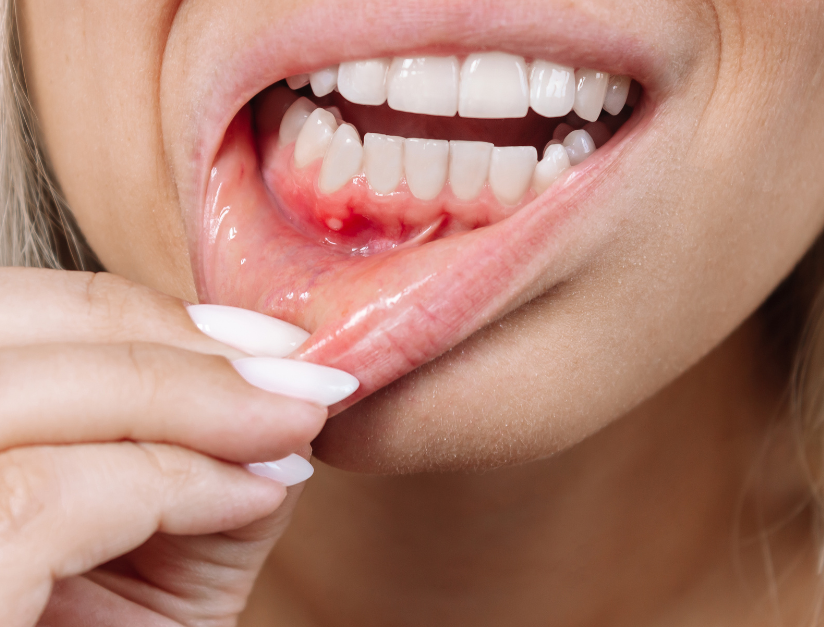After brushing your teeth, have you ever seen some blood in the sink? Maybe you didn’t think much of it at first. But if it keeps happening, it’s not something you should ignore. Gum bleeding is more than just a minor annoyance; it’s often your body’s way of alerting you to a potential problem.
At Royal Oral & Dental Clinic in Kanpur, we frequently see patients who are worried about bleeding gums. And rightly so. Dr. Deepesh Gupta explains that while many people assume it’s due to brushing too hard, in reality, gum bleeding can signal early-stage gum disease or other underlying health issues.
Let’s break it down in simple terms so you know what’s happening—and more importantly, what you can do about it.
Is It Normal for Gums to Bleed While Brushing?
The short answer: No, it’s not normal.
While it might seem harmless, especially if there’s no pain, healthy gums shouldn’t bleed. Even if you brush firmly or floss after a long break, persistent bleeding is a red flag that your gums are inflamed or irritated.
Common Reasons Your Gums Might Be Bleeding
1. You May Have Gingivitis
Gingivitis, a minor form of gum disease, is one of the main reasons of bleeding gums. Plaque accumulation around the gum line is the first sign, and it progresses to bleeding, swelling, and redness. Fortunately, it’s treatable if caught early.
2. Your Brushing Technique Could Be Too Harsh
Believe it or not, brushing too hard doesn’t clean better—it can actually hurt your gums. If you use a hard-bristled brush or aggressive strokes, your gums might respond with bleeding.
3. Poor Oral Hygiene Habits
Plaque can solidify into tartar if you neglect to brush your teeth, floss, or see your dentist on a regular basis. This irritates your gums and causes bleeding over time.
4. Vitamin Deficiencies
A lack of vitamin C or vitamin K in your diet can also make your gums more prone to bleeding. If you’re not eating enough fresh fruits or leafy greens, this could be contributing.
5. Hormonal Changes in Women
Women may experience bleeding gums during pregnancy, menstruation, or menopause due to hormonal changes that affect gum sensitivity.
6. Side Effects from Medications
If you’re on blood thinners or certain heart medications, bleeding gums might be one of the side effects. Always inform your dentist about any prescriptions you’re taking.
What Can You Do to Stop Gum Bleeding?
Let’s talk solutions. The good news is that bleeding gums can usually be treated and even prevented with simple changes.
Use a Soft-Bristled Toothbrush
Switching to a softer brush and brushing gently in circular motions can reduce irritation and allow your gums to heal.
Floss Daily
It’s not just about removing food particles—flossing helps clean between teeth where your toothbrush can’t reach, preventing plaque buildup.
Rinse with a Dentist-Recommended Mouthwash
Antibacterial mouthwash can reduce inflammation and kill germs that lead to gum infections.
Don’t Skip Your Dental Visits
A professional cleaning removes tartar that you can’t get rid of at home. At Royal Oral & Dental Clinic, we provide safe, gentle cleanings tailored to your gum condition.
Eat a Balanced Diet
Include foods rich in vitamins C, K, and calcium. Hydrate well and cut back on sugary snacks that feed bacteria.
How Dr. Deepesh Gupta Can Help
At Royal Oral & Dental Clinic in Kanpur, Dr. Deepesh Gupta approaches every patient with careful attention and empathy. When a patient complains about gum bleeding, we don’t just treat the symptom—we look for the cause.
Whether it’s a case of gingivitis or something more advanced, Dr. Gupta develops a personalized treatment plan that suits your needs. From basic scaling and polishing to deeper gum cleaning procedures, everything is done with your comfort in mind.
When Should You See a Dentist?
While occasional bleeding might not seem serious, frequent or severe gum bleeding warrants professional care. Make an appointment if you notice:
-
Bleeding every time you brush or floss
-
Swelling or pain in your gums
-
Persistent bad breath
-
Pus near the gum line
-
Loose teeth
These could be signs of periodontitis, a more serious gum infection that can lead to tooth loss if not treated promptly.
Prevention Is Better Than a Cure
Here’s a quick guide to keep your gums healthy:
-
Brush twice a day (gently)
-
Floss at least once a day
-
Replace your toothbrush every 3 months
-
Eat a diet rich in fruits and greens
-
Get a dental check-up every 6 months
Small daily habits make a big difference in your long-term gum health.
Final Words from Dr. Deepesh Gupta
“Bleeding gums may seem small, but they can hint at bigger oral health issues,” says Dr. Gupta. “Don’t wait for pain or tooth loss. If something feels off, your mouth is trying to tell you something.”
At Royal Oral & Dental Clinic, we’re here to help you maintain not just a great smile—but a healthy mouth that supports your overall well-being.
Schedule Your Visit Today
Don’t let gum bleeding become a bigger problem. Visit us for expert care and honest advice.
Royal Oral & Dental Clinic, Kanpur

